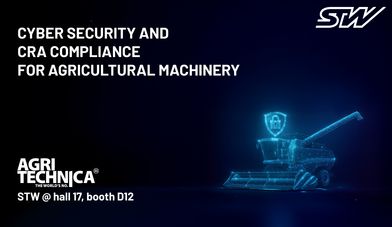Cyber security has been an important aspect of the development of agricultural machinery and equipment since long before the announcement of new EU regulations such as the Cyber Resilience Act (CRA). As fully networked devices, harvesters in particular are prime targets for manipulation and cyber attacks.
STW supports OEMs in the implementation of secure software systems.
Machine-to-machine networking, data exchange with the cloud, and connection to digital ERP and management systems are far more widespread in agricultural technology than in other application areas for mobile machinery. The trend toward maximum harvesting efficiency and precision farming, right down to individual plant cultivation, has accelerated the integration of highly automated digital processes in agriculture, making it a pioneer in these areas.
However, the integration of digital components and communication has increased the risk of data leaks and cyber attacks. These are particularly critical in agricultural processes, which usually involve tight time windows or just-in-time coordination of multiple vehicles and devices, as process interruptions caused by cyber attacks can potentially jeopardize a large portion of the harvest. The number of ransomware attacks on agricultural businesses or industry-related software systems has risen steadily in recent years, and a further increase is expected.
Regulations for greater protection against cyber attacks
In order to better protect machine operators against ransomware attacks and similar threats, the EU has introduced several cybersecurity regulations. These apply to both machine manufacturers and suppliers of critical components, such as automation or assistance system solutions. For example, the Radio Equipment Directive (RED-DA) came into force in August. It obliges manufacturers of products with radio interfaces, i.e. telemetry or communication modules, to ensure the security of data transmitted via Wi-Fi, mobile communications, or Bluetooth.
The new EU Machinery Regulation (MVO) will come into force at the beginning of 2027. It applies to all hardware components relevant to cybersecurity, as well as software. Manufacturers must ensure that their systems are protected against hacker attacks and are required to provide evidence of any cyberattacks on their software.
In November 2027, the Cyber Resilience Act (CRA) will come into force as the final measure for greater cybersecurity in Europe so far. The CRA applies to all products with “digital elements,” both software and hardware – and thus to almost every modern agricultural machine, as these usually have a data interface, either physical or wireless. According to the CRA, agricultural machinery manufacturers and their automation partners are obliged to ensure cybersecurity across the entire value chain, provide security updates for at least five years, and document and report vulnerabilities and attempts at manipulation.
Cyber security challenges for manufacturers of agricultural equipment
For agricultural machinery manufacturers, these requirements mean that they must provide or develop additional capacity and expertise to ensure compliance with these guidelines. Alternatively, external service providers must be consulted. However, specialized cybersecurity consulting firms are expensive and usually unfamiliar with the processes and peculiarities of agricultural technology. This results in high time and financial costs for onboarding, coordination, and the necessary adjustments.
The STW cyber security team can be an efficient and specialized partner in this regard. Since the company was founded 40 years ago, we have been at home in the automation and digitalization of agricultural machinery and are partners to leading OEMs worldwide. As a developer of functionally safe control and sensor components and, above all, suitable software, cyber security for hardware and software has long been a central aspect of our work. STW automation systems feature powerful hardware and software protection mechanisms against cyber security manipulation. In addition, we support machine manufacturers in complying with the new regulations by conducting conformity tests. These tests include security risk analyses (TARA), vulnerability scans, and penetration tests. You can read about our cybersecurity services here or experience them live at Agritechnica 2025 in Hanover.
Visit us from November 9 to 15 in Hall 17 at Booth D12.
